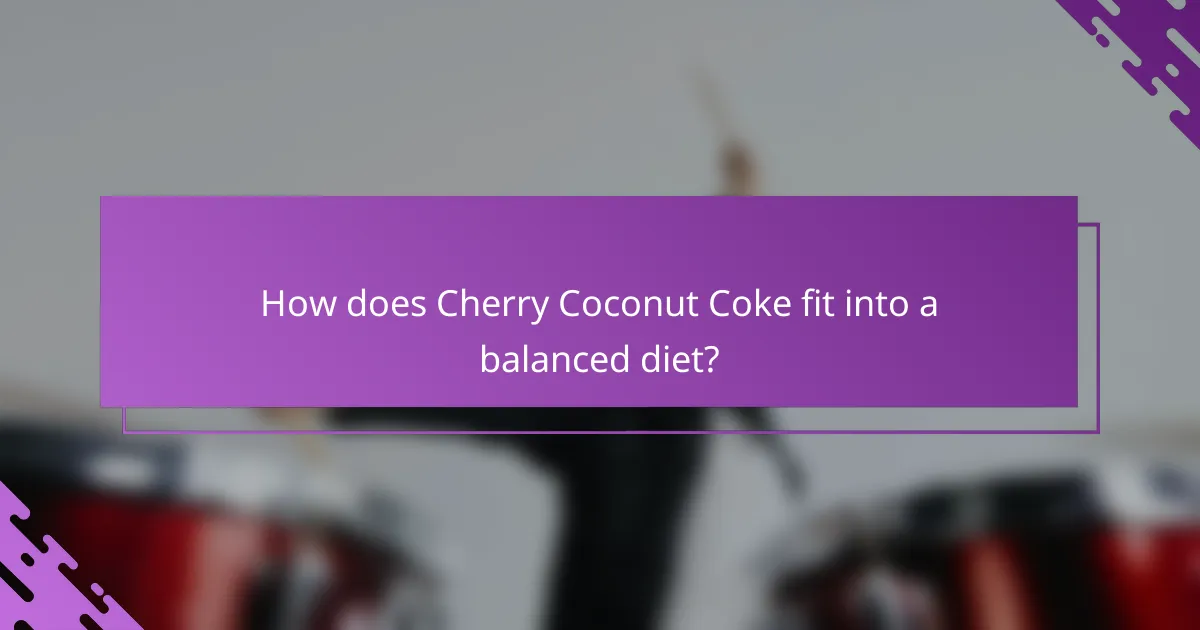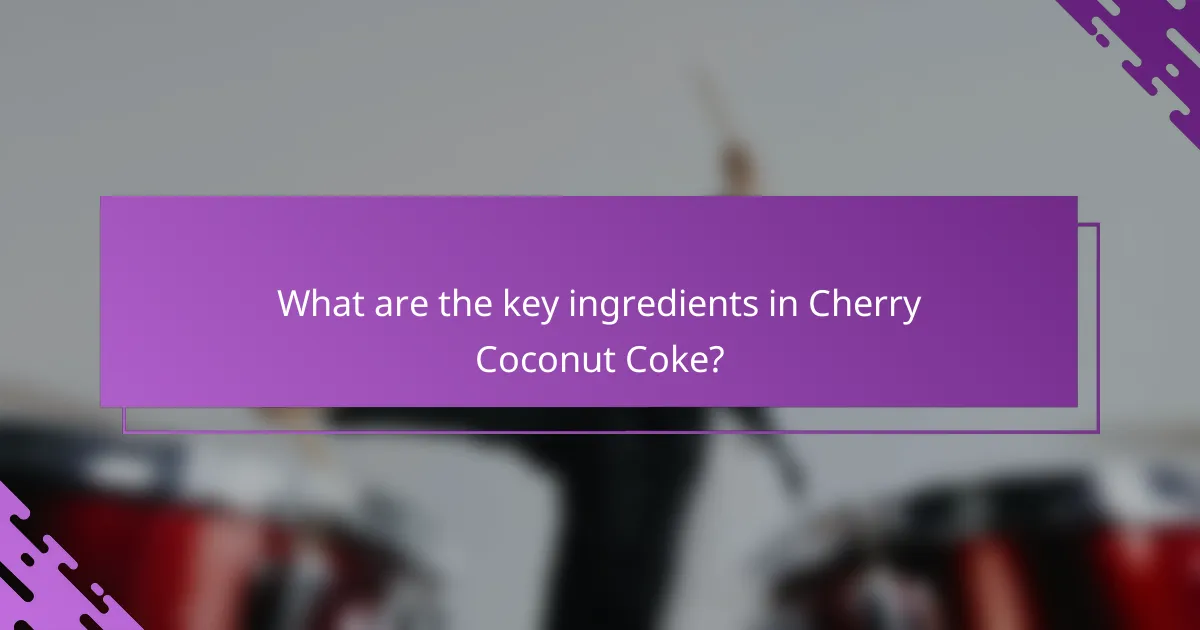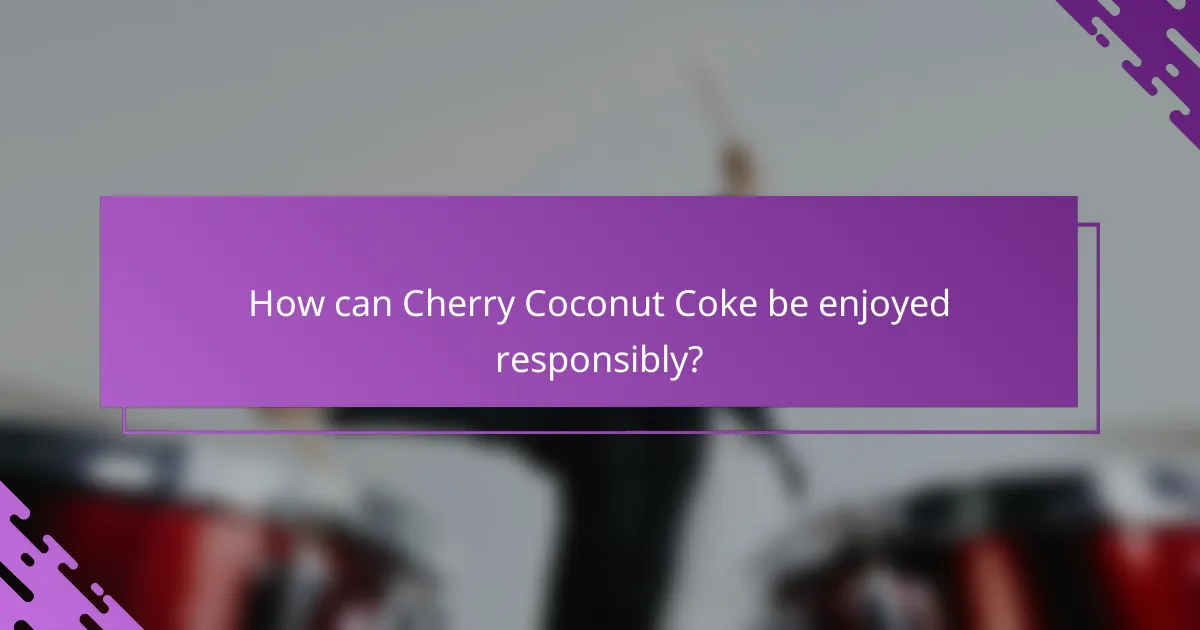Cherry Coconut Coke offers a delightful blend of cherry extract and coconut flavoring, creating a unique tropical beverage experience. While it can be enjoyed as an occasional treat, it’s important to consume it in moderation due to its sugar content and potential health implications. Balancing indulgence with a healthy diet is essential to mitigate any adverse effects associated with excessive consumption.

What are the health effects of Cherry Coconut Coke?
Cherry Coconut Coke combines tropical flavors with the sweetness of soda, but its health effects can vary. While it may offer some enjoyment, moderation is key due to its sugar content and potential impact on overall health.
Potential benefits of tropical ingredients
The tropical ingredients in Cherry Coconut Coke, such as coconut and cherry, can provide some nutritional benefits. Coconut contains medium-chain triglycerides (MCTs), which may support energy levels and metabolism. Additionally, cherries are rich in antioxidants, which can help reduce inflammation and promote overall health.
However, the actual health benefits depend on the quantity consumed and the overall diet. Enjoying Cherry Coconut Coke occasionally can add a fun twist to your beverage choices without significant health drawbacks.
Possible risks associated with consumption
Despite its tropical appeal, Cherry Coconut Coke contains high levels of sugar, which can lead to various health issues if consumed excessively. Regular intake of sugary beverages is linked to weight gain, increased risk of type 2 diabetes, and dental problems. It’s advisable to limit consumption to avoid these risks.
Furthermore, the caffeine content in soda can lead to increased heart rate and anxiety in sensitive individuals. Always check the label for caffeine levels and consider your tolerance before indulging.
Impact on hydration levels
Cherry Coconut Coke is not an ideal choice for hydration. While it contains water, the high sugar and caffeine content can lead to dehydration rather than replenishment. Sugary drinks can increase thirst and may not satisfy hydration needs effectively.
For optimal hydration, water or electrolyte-rich beverages are recommended. If you choose to enjoy Cherry Coconut Coke, consider balancing it with plenty of water throughout the day to maintain hydration levels.

How does Cherry Coconut Coke fit into a balanced diet?
Cherry Coconut Coke can be enjoyed as an occasional treat within a balanced diet, but moderation is key. It contains added sugars and calories that can contribute to weight gain and other health issues if consumed excessively.
Moderation guidelines for soft drink consumption
To maintain a balanced diet, limit soft drink consumption to occasional servings. Health experts often recommend that added sugars should not exceed 10% of daily caloric intake, which translates to about 50 grams for a 2,000-calorie diet.
Consider replacing sugary drinks with water or unsweetened beverages most of the time. If you choose to indulge in Cherry Coconut Coke, aim for a small serving size, perhaps a 12-ounce can, and balance it with healthier food choices throughout the day.
Comparative analysis with other soft drinks
Cherry Coconut Coke typically contains similar sugar levels to other flavored soft drinks, often ranging from 30 to 40 grams per 12-ounce serving. In comparison, diet sodas offer zero calories and sugar but may contain artificial sweeteners, which some consumers prefer to avoid.
When comparing it to fruit juices, keep in mind that while juices may contain natural sugars, they can also have high calorie counts. A 100% fruit juice can have about 25 grams of sugar per 8-ounce serving, making Cherry Coconut Coke a comparable option in terms of sugar content but different in terms of nutritional value.

What are the key ingredients in Cherry Coconut Coke?
Cherry Coconut Coke combines cherry extract and coconut flavoring to create a unique tropical beverage. These ingredients contribute to its distinct taste and can have varying health effects depending on consumption levels.
Cherry extract and its flavor profile
Cherry extract provides a sweet and tart flavor that enhances the overall taste of Cherry Coconut Coke. This extract is typically derived from real cherries, which can offer a more authentic cherry flavor compared to artificial alternatives.
In addition to its flavor, cherry extract contains antioxidants, which may provide some health benefits. However, the concentration of these beneficial compounds can vary based on the amount of extract used in the beverage.
Coconut flavoring and nutritional aspects
Coconut flavoring adds a creamy, tropical note to Cherry Coconut Coke, making it appealing to those who enjoy coconut. This flavoring can come from natural coconut extracts or artificial sources, impacting the drink’s overall quality and taste.
Nutritionally, coconut flavoring may not contribute significant calories or nutrients, but it can enhance the sensory experience of the drink. Moderation is key, as excessive consumption of sugary beverages like Cherry Coconut Coke can lead to health issues such as weight gain and increased sugar intake.

How can Cherry Coconut Coke be enjoyed responsibly?
Cherry Coconut Coke can be enjoyed responsibly by being mindful of portion sizes and the frequency of consumption. Moderation is key to balancing enjoyment with health considerations, especially due to its sugar content and caffeine levels.
Serving size recommendations
A standard serving size for Cherry Coconut Coke is typically around 12 ounces (355 ml). To enjoy it responsibly, consider limiting intake to one serving per day to avoid excessive sugar and calorie consumption.
For those monitoring their sugar intake, it may be beneficial to dilute the drink with soda water or ice, which can help reduce overall calories while still providing a refreshing taste.
Pairing with tropical snacks
Cherry Coconut Coke pairs well with tropical snacks such as fresh fruit, coconut chips, or light popcorn. These options complement the drink’s flavors while keeping the overall snack low in calories and sugar.
Consider serving it alongside a fruit platter featuring pineapple, mango, and watermelon for a refreshing and balanced treat. This combination enhances the tropical experience without overwhelming your diet.

What are the alternatives to Cherry Coconut Coke?
Alternatives to Cherry Coconut Coke include other tropical-flavored soft drinks and healthier beverage options that provide similar flavors without the added sugars and calories. Exploring these alternatives can help you enjoy tropical tastes while making better dietary choices.
Other tropical-flavored soft drinks
There are several tropical-flavored soft drinks available that can serve as alternatives to Cherry Coconut Coke. Brands like Fanta and Sprite offer flavors such as pineapple, mango, and passion fruit, which capture the essence of tropical fruits.
Additionally, some craft soda companies produce unique tropical blends that may include coconut, guava, or hibiscus. These options often have varying levels of sweetness and carbonation, allowing you to choose based on your taste preferences.
Healthier beverage options
If you’re looking for healthier alternatives, consider sparkling water infused with tropical flavors. Brands like LaCroix and Spindrift offer options that provide flavor without added sugars or calories.
Another option is to create your own tropical drink by mixing coconut water with fresh fruit juices. This can provide hydration and essential nutrients while keeping the sugar content lower than traditional sodas.

What trends are emerging in tropical soft drinks?
Tropical soft drinks are increasingly featuring unique flavors and natural ingredients, reflecting a shift in consumer preferences. As health consciousness rises, brands are adapting to meet the demand for exotic tastes and cleaner labels.
Growing popularity of exotic flavors
Exotic flavors like cherry and coconut are gaining traction in the soft drink market, appealing to consumers looking for new taste experiences. Brands are experimenting with combinations that evoke tropical destinations, enhancing the overall drinking experience.
For example, Cherry Coconut Coke combines sweet cherry and creamy coconut, creating a refreshing beverage that stands out on shelves. This trend is not just limited to sodas; it extends to juices and flavored waters, as consumers seek variety in their beverage choices.
Consumer preferences for natural ingredients
There is a noticeable shift towards natural ingredients in tropical soft drinks, driven by health-conscious consumers. Many brands are reformulating their products to reduce artificial additives and sweeteners, opting instead for real fruit extracts and organic components.
For instance, some companies are now using cane sugar or stevia instead of high-fructose corn syrup, appealing to those who prioritize health. This trend aligns with growing awareness of nutrition and wellness, encouraging consumers to read labels and choose beverages that align with their dietary preferences.


